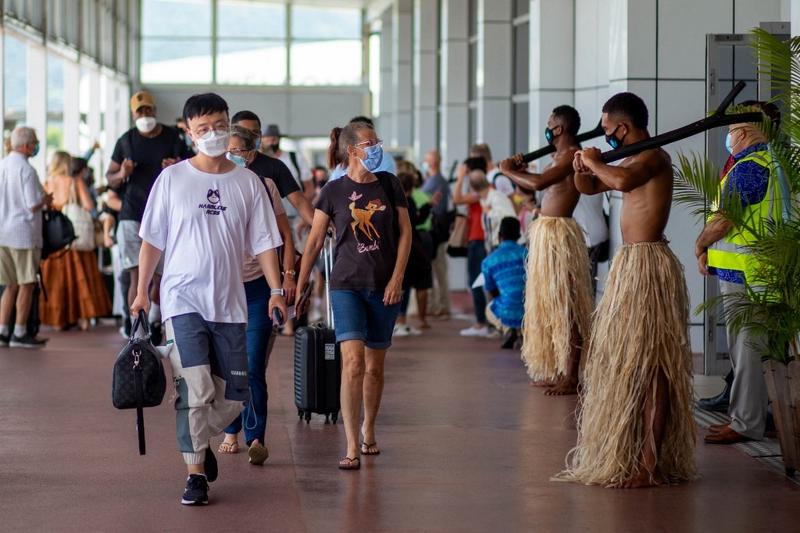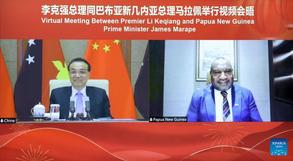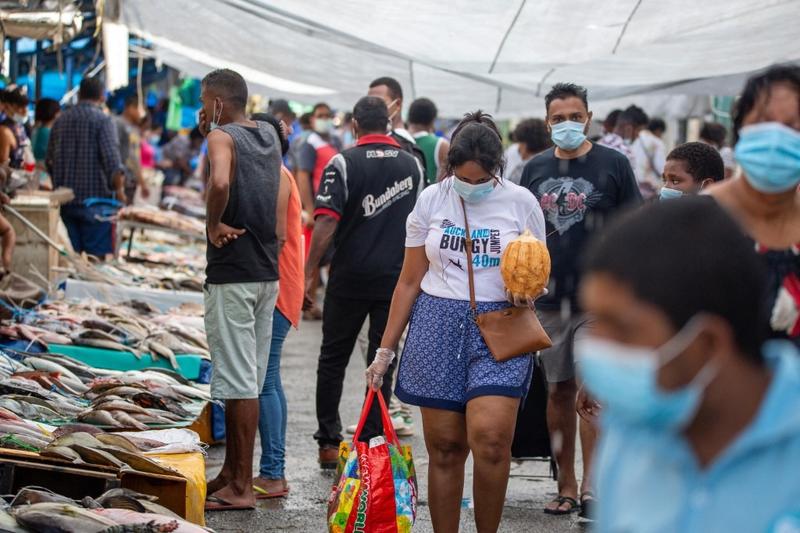 Traditional dancers in grass skirts welcome holidaymakers in Nadi on Dec 1, 2021, as Fiji opens its borders to international travelers for the first time since the COVID-19 pandemic swept the globe and devastated its tourism-reliant economy. (LEON LORD / AFP)
Traditional dancers in grass skirts welcome holidaymakers in Nadi on Dec 1, 2021, as Fiji opens its borders to international travelers for the first time since the COVID-19 pandemic swept the globe and devastated its tourism-reliant economy. (LEON LORD / AFP)
The closer attention of Australia and New Zealand to Pacific Islands states recently can be directed more to improving livelihoods of local peoples than to geopolitics, according to analysts.
The foreign ministers of Australia and New Zealand, Penny Wong and Nanaia Mahuta, recently reaffirmed their commitment to “working collectively” to meet the needs of the Pacific nations even as they build closer ties with China.
“The sustainability and debt financing for developing countries, particularly those in our region, is of interest to both our nations,” Australia’s Wong said on June 16.
“It goes to sovereignty and choice, and it goes to stability. It also potentially goes to security of the region.”
Peter Ipatas, governor of the Enga province, said it was a dream for the people of Papua New Guinea and the country to have a medical center with advanced technologies, and thanks to China's help, the dream came true
Wong and her New Zealand counterpart, Mahuta, both stressed that Australia and New Zealand need to work with Pacific nations to prevent the small countries from becoming “indebted to international actors”, a veiled reference to China’s growing influence in the Pacific.
In recent years China’s role in the Pacific has been viewed with growing suspicion in Washington, Canberra and, to a lesser extent, in Wellington.
Much of the rhetoric ignores the huge benefits China is bringing to Pacific Island nations.
On June 20, China handed over a newly-built provincial hospital in Enga to the government of Papua New Guinea, which will help improve medical services for local people.
ALSO READ: Pacific islands no longer spared pandemic's force
Addressing the handover ceremony in the Engan capital of Wabag, PNG Prime Minister James Marape thanked the Chinese government for its support for the high-quality project, saying that the PNG government is willing to deepen cooperation with China in all areas, according to a report by Xinhua.
Peter Ipatas, governor of the Enga province, said it was a dream for the people of Enga and the country to have a medical center with advanced technologies, and thanks to China's help, the dream came true.
Calling the project the latest outcome of bilateral cooperation in the health sector, China’s ambassador to PNG, Zeng Fanhua, said China and PNG are both developing countries, and that the bilateral cooperation demonstrates friendship as well as mutual support and trust.
 Chinese Premier Li Keqiang meets with Papua New Guinea's Prime Minister James Marape via video link, at the Diaoyutai State Guesthouse in Beijing, capital of China, Feb 5, 2022. (YAO DAWEI / XINHUA)
Chinese Premier Li Keqiang meets with Papua New Guinea's Prime Minister James Marape via video link, at the Diaoyutai State Guesthouse in Beijing, capital of China, Feb 5, 2022. (YAO DAWEI / XINHUA)
The fact is that China is bringing prosperity to some of the world’s most disadvantaged people, be it through providing scholarships, building hospitals and schools, or vital infrastructure, observers say
China is ready to continue providing assistance to PNG's social and economic development, the envoy added.
Inia Batikoto Seruiratu, Fiji's minister for defense, national security and policing, said recently that China is a “key development partner” in the Pacific.
Speaking at the recent Shangri-La Dialogue held in Singapore, he said: “That is a known fact and that is accepted as well in the region.”
He said the Pacific Islands region respects what China has done in terms of cooperation.
Noting the creation of fear about the region through disinformation and misinformation, Seruiratu said, "We all have the sovereign right to make our own decisions."
The fact is that China is bringing prosperity to some of the world’s most disadvantaged people, be it through providing scholarships, building hospitals and schools, or vital infrastructure, observers say.
Leon Perera, chairman of Singapore-based Spire Research and Consulting, said Pacific island states are benefiting from closer relations with China.
“A point of reference would be how China has deepened ties with African states; (with) Central Asian states through the belt and road initiative; and (with) other regional states such as Laos and Sri Lanka,” he told China Daily.
 This picture taken on April 24, 2021 shows residents wearing face masks walking through the fish market in the Fijian capital Suva. (LEON LORD / AFP)
This picture taken on April 24, 2021 shows residents wearing face masks walking through the fish market in the Fijian capital Suva. (LEON LORD / AFP)
Leon Perera, chairman of Singapore-based Spire Research and Consulting, said Pacific island states are benefiting from closer relations with China
Ying Zhu, director of the Australian Centre for Asian Business at the University of South Australia, said China wants to help the Pacific nations to develop their economies.
READ MORE: China-Pacific islands cooperation sees vitality, bright future
“This means building the infrastructure needed to bring goods to markets and offering loans. China also helps in social development such as education and health.
“This is where the Belt and Road Initiative is so important,” he said.
Perera said one area of infrastructure which is “clearly on the minds of Pacific island leaders” involves coastal defenses against sea-level rise due to climate change.


